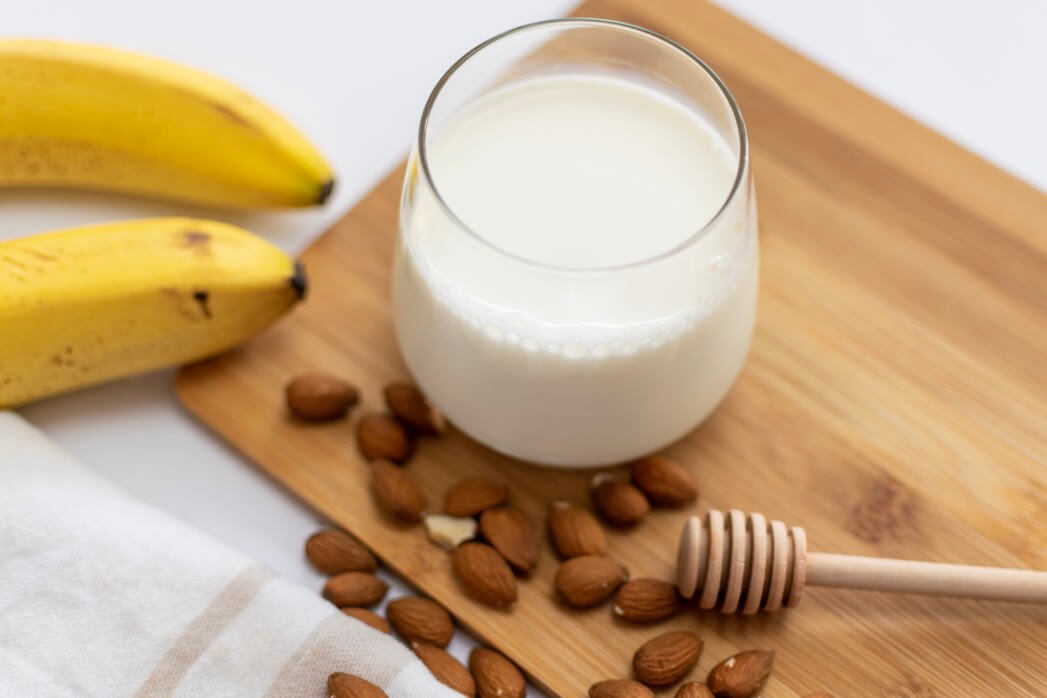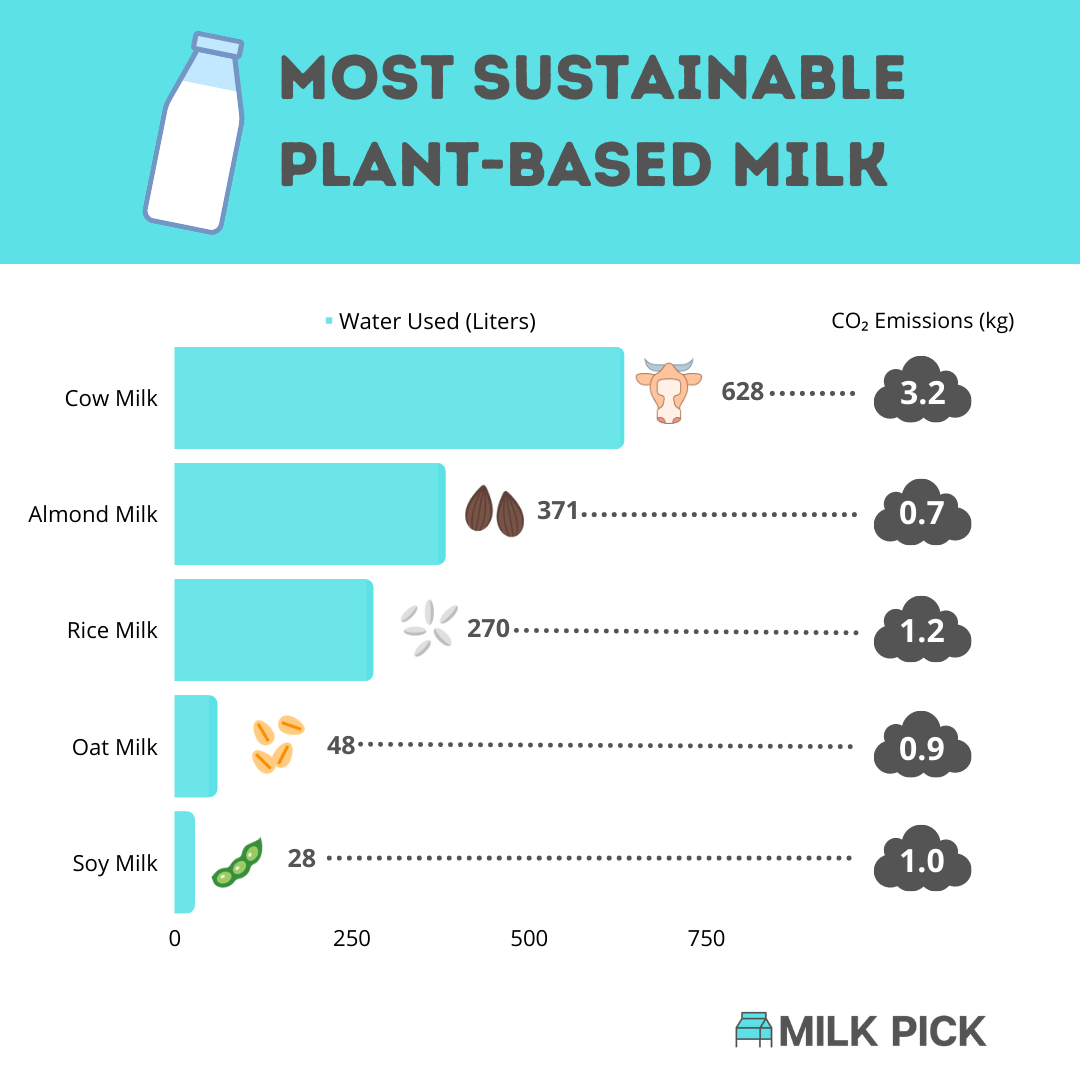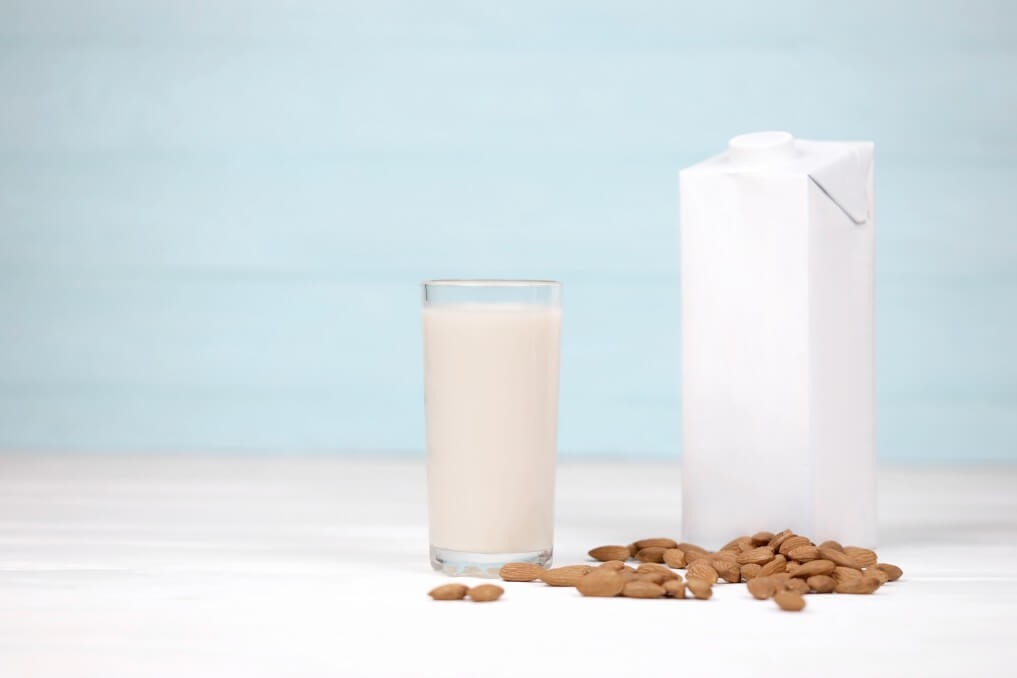When it comes to plant-based milk, almond milk was the frontrunner for a while.
Recently, however, oat milk has become the milk of choice for many. So, which one is right for you?
Oat milk is higher in almost all nutrients, including protein, than almond milk and much better for the planet because almonds are very water intensive. Oat milk is much thicker than almond milk and can froth easier. Oat milk is higher in calories than almond milk.
So, let’s explore the similarities and differences between the two plant-based milk options and compare and contrast so you know which one to add to your latte order.
Oat Milk vs Almond Milk: Nutrition
Let’s begin by examining the nutritional information for these respective plant-based milk options.
1 cup (240mL) of each milk contains:
1 Cup | Oat Milk | Almond Milk |
|---|---|---|
Calories | 120 | 39 |
Protein | 3g | 1g |
Fat | 5g | 3g |
Carbohydrates | 16g | 4g |
Fiber | 2g | 1g |
Data sources: Almond milk, Oat milk, Disclaimer about this information
As you can see, oat milk is higher in most nutritional areas.
Almond milk is popular for people trying to watch their calories and carbs as you can see in this table, it is a low-calorie milk option. However, it's also low in protein, fats, carbs, and fiber.
Oat milk, on the other hand, is relatively high in all these areas, especially when compared to other animal milk and plant-based milk options.
One glass of oat milk will keep you satiated for longer than almond milk because of its protein, fat, carbs, and fiber. Thus, an oat milk latte may help keep your energy up for longer than one with almond milk.
Now consider the vitamins and minerals contained in each:
1 Cup | Oat Milk | Almond Milk |
|---|---|---|
Vitamin B12 | 50% DV | 0% DV |
Riboflavin | 45% DV | 2% DV |
Calcium | 25% DV | 24% DV |
Phosphorus | 20% DV | 4% DV |
Vitamin D | 20% DV | 18% DV |
Vitamin A | 20% DV | 10% DV |
Potassium | 8% DV | 4% DV |
Iron | 2% DV | 2% DV |
Vitamin E | 0% DV | 110% DV |
This table differs from the one above because it only mentions the vitamins and minerals that are found naturally in the beverages.
Many of these plant-based milk options are fortified with certain vitamins to enhance their nutritional profile. Thus, you can purchase almond milk that is higher than these numbers indicate if you buy a brand of almond milk that is enhanced with extra protein, fiber, B12, Vitamin D, etc.
The same holds for oat milk. However, you will notice oat milk brands rarely add to their product as the milk naturally contains various nutrients.
In terms of calcium and vitamin D, oat and almond milk are comparable.
These plant-based options actually contain more calcium than cow’s milk which tends to surprise some cow’s milk advocates.
As you'll see in our Almond Milk 101 video, almond milk is also significantly rich in Vitamin E which serves as excellent protection from the sun.
In most other areas though, oat milk beats almond in terms of nutrients.
Oat milk’s high B12 profile is a significant draw for people on plant-based diets because B12 can be a tough vitamin to consume naturally without animal products.

Almond Milk vs. Oat Milk: Flavor
Besides their different nutritional profiles, oat and almond milk differ in both taste and texture.
Now, in terms of taste, oat milk is subtle while almond milk has a more nutty flavor.
This is why coffee connoisseurs will exclusively add oat milk to their espresso as it doesn’t change the taste of the coffee in the manner that almond milk does.
However, almond milk comes in many more flavors than oat milk. You can choose from unsweetened or sweetened, vanilla, chocolate, or natural, and various other options in the almond milk department.
While oat milk does have some similar choices, you’re more likely to see just the barista or regular types.
When it comes to plant-based milk, we almost always recommend going for plain, unflavored versions. Flavored non-dairy milk is often high in sugar and contains artificial flavor.
Almond Milk vs. Oat Milk: Texture
Oat milk is a favorite amongst many because of its thick, creamy texture.
In this sense, oat milk is the most similar plant-based milk to cow’s milk. This texture makes it easy to froth up for the perfect cappuccino.
Almond milk, on the other hand, is quite thin. Some compare it to skim cow’s milk as it is rather refreshing because of its waterier consistency.
However, this property makes it nearly impossible to get foamy even with the best barista machines.
Is Almond Milk or Oat Milk More Popular?
For a very long time, almond milk was one of the few plant-based options offered in both the grocery store and at coffee shops besides soy milk.
For this reason, it held the lead amongst both plant-based consumers and flexitarians.
However, in recent years, and likely for all the nutritional and texture considerations we’ve mentioned above, oat milk is on the rise.
Oat milk has drawn non-plant-based buyers because of its tasty texture. You’ll notice oat milk lattes being ordered across the world proving its universal popularity.
According to data from Google Trends, searches for oat milk have steadily increased over the past five years, but almond is still has the lead.
Is Almond Milk or Oat Milk Better for the Environment?
One reason for the surge in plant-based milk is the rising concern over the climate crisis.
Animals, especially, cows are not great in terms of greenhouse gas emissions and deforestation.
And though almond and oat milk are both far better for the planet than animal milk, there is a difference between them, environmentally speaking.
Almonds take an incredible amount of water to grow.
It takes approximately 370-380 liters of water to produce one liter of almond milk. Thus, almond milk is not considered an eco-friendly plant-based drink.
Oat milk on the other hand, is much easier on the planet and requires far less water to produce. If you’re making your decision for the environment, oat milk is an unequivocal winner.

Which is More Expensive: Almond Milk or Oat Milk?
The price of the milk depends on the brand you’re buying.
For example, oat milk from a small farm that is organically grown will likely be more expensive than that made by a large producer with plants all over the country.
On average, the price difference between almond milk and oat milk is not very significant.
The cost will vary according to the brand, the size, the packaging, the ingredients, and the transport costs.
On average, you can expect t spend anywhere from $3.50-$6.00 for a carton of almond or oat milk. Shelf-stable milk tends to cost less, but they contain more additives and preservatives.
How to Decide Between Oat Milk and Almond Milk
Now, how do you know which is the right one for you?
Neither option is inherently unhealthy so choosing between the two simply comes down to a matter of preference.
Let’s discuss the differences so you can make an informed decision that is best for you.
If You Care About Calories: Almond Milk
If you are closely monitoring your calorie consumption and/or your intake of carbohydrates, you may prefer choosing almond milk.
Its calorie count is very low compared to both cow’s milk and other plant-based options.
If you’re on a Keto-inspired diet, then you don’t have many carbs to spare so you may want to skip the ones in oat milk and opt for the low in carb almond option.
However, oat milk is not extremely high in calories and the calories it does contain are very healthy.
They are calories rich in nutrients such as Vitamin B12, Calcium, and Riboflavin.
Oat milk also contains healthy fat which is excellent for brain function and protein which helps keep you satiated.

If You Want to Feel Full: Oat Milk
Beyond the nutritional facts, your preference may depend upon your intended use for the plant-based beverage.
For instance, if you are a gym rat looking for a nutrient-packed liquid to add to your post-burn smoothie then we highly recommend oat milk.
Not only will adding oat milk boost the nutritional value of your smoothie and help keep you satiated for longer, but it will also give it a deliciously creamy texture resembling a milkshake.
If You Want Variety: Almond Milk
Almond milk comes in a variety of flavors and is sold by a wide number of brands, each with different recipes.
That's one of the reasons people prefer it in their coffee. For instance, sweetened vanilla almond milk will change the flavor of your coffee but perhaps in a way that works for you. The same goes for smoothies.
Additionally, if you simply enjoy the taste of almonds then almond milk is for you.

If You Want to Froth Your Coffee: Oat Milk
Now, if you are a coffee fanatic in search of a milk replacement that will foam up for the perfect latte without changing that aromatic coffee flavor then we recommend oat milk.
For all the reasons already mentioned, oat milk is a great addition to your morning or afternoon coffee.
Related: Can You Froth Oat Milk?
Almond Milk or Oat Milk?
Now that you know the ins and outs of the almond vs oat milk debate. Let’s summarize how to decide on the best plant-based milk for you.
Remember oat milk contains more nutrients and vitamins than almond milk, including protein, Vitamin B12, and carbohydrates.
However, almond milk is higher in Vitamin E. Oat milk is more caloric than almond milk and has a thicker, creamy consistency.
Finally, oat milk is much more environmentally friendly than almond.
So, will you join the oat milk trend or keep to the almond?

